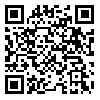Volume 17 - Supplement of 11th Annual Iranian Congress of Medical Ethics (Posters)
IJMEHM 2024, 17 - Supplement of 11th Annual Iranian Congress of Medical Ethics (Posters): 1-2 |
Back to browse issues page
Download citation:
BibTeX | RIS | EndNote | Medlars | ProCite | Reference Manager | RefWorks
Send citation to:



BibTeX | RIS | EndNote | Medlars | ProCite | Reference Manager | RefWorks
Send citation to:
Salimi Akinabadi A, Jahangiri M, Zandi M. Ethical Challenges in ICU. IJMEHM 2024; 17 (S1) :1-2
URL: http://ijme.tums.ac.ir/article-1-6876-en.html
URL: http://ijme.tums.ac.ir/article-1-6876-en.html
1- Master of Medical Surgical Nursing, Clinical Research Development Center, Shahid Modarres Educational Hospital, Shahid Beheshti University of Medical Sciences, Tehran, Iran
2- Student Research Committee, Qazvin University of Medical Sciences, Qazvin, Iran
3- Associate Professor of Medical Surgical Nursing, School of Nursing and Midwifery, Shahid Beheshti University of Medical Sciences, Tehran, Iran
2- Student Research Committee, Qazvin University of Medical Sciences, Qazvin, Iran
3- Associate Professor of Medical Surgical Nursing, School of Nursing and Midwifery, Shahid Beheshti University of Medical Sciences, Tehran, Iran
Abstract: (175 Views)
The intensive care unit (ICU) is a complex environment where diverse healthcare professionals collaborate to care for critically ill patients. Evidence suggests that ethical issues or conflicts are prevalent and can negatively impact ICU care. This research aimed to investigate the ethical challenges encountered by critical care nurses in clinical practice. Using the PRISMA guideline, relevant studies were identified through searches of the PubMed, Scopus, and Web of Science databases from 2015-2024 using the following MeSH terms: "ethics," "ethical challenges," "nursing," and "intensive care unit." Only English-language manuscripts were included. Ethical challenges in the ICU were categorized as follows:
1. Internal Constraints: Lack of self-confidence, fear, maladaptive coping mechanisms, religious conflicts, and spiritual conflicts.
2. External Constraints: Lack of collegiality, hierarchical structures, poor communication, inadequate staffing, restrictive policies, shortages of full-time critical care physicians and nurses, and working with incompetent staff.
3. Clinical Situations: Futile treatment, inappropriate care, inadequate pain relief, hastening death, providing false hope, end-of-life care decisions, decisions about life-sustaining treatments, and the use of physical restraints.
Recognizing ethical challenges in the ICU is crucial. It enables the implementation of measures to minimize ethical conflict, design effective strategies for preventing ethical dilemmas, and improve the nursing work environment.
1. Internal Constraints: Lack of self-confidence, fear, maladaptive coping mechanisms, religious conflicts, and spiritual conflicts.
2. External Constraints: Lack of collegiality, hierarchical structures, poor communication, inadequate staffing, restrictive policies, shortages of full-time critical care physicians and nurses, and working with incompetent staff.
3. Clinical Situations: Futile treatment, inappropriate care, inadequate pain relief, hastening death, providing false hope, end-of-life care decisions, decisions about life-sustaining treatments, and the use of physical restraints.
Recognizing ethical challenges in the ICU is crucial. It enables the implementation of measures to minimize ethical conflict, design effective strategies for preventing ethical dilemmas, and improve the nursing work environment.
Type of Study: Ethics Congress |
Subject:
Congress of Ethics
Received: 2025/02/22 | Accepted: 2024/12/23 | Published: 2024/12/23
Received: 2025/02/22 | Accepted: 2024/12/23 | Published: 2024/12/23
| Rights and permissions | |
 |
This work is licensed under a Creative Commons Attribution-NonCommercial 4.0 International License. |





